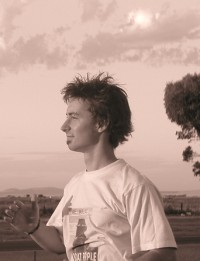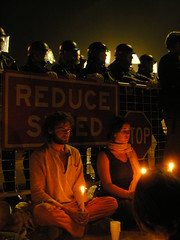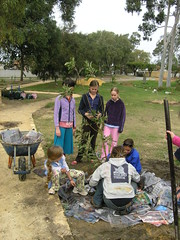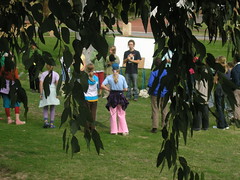This interview is a repost from my blog on the Mennonite of an interview with Jarrod McKenna, a leader in the Emerging Church movement in Australia and founder of Empowering Peacemakers in Your Community, an organization that runs trainings on nonviolence and ecology in Australian schools, churches and prisons. I’ve previously referenced an article Jarrod has written on Emerging Peace Church Movement & the “Open Anabaptist Impulse”. Jarrod won the Donald Groom Peace Fellowship, a national Australian peace award. The Original intention was to do an interview with him for this blog and so, though I published it on the Mennonite site first, I think YAR is its true home. Enjoy! If you have your own questions for Jarrod, feel free to leave them in a comment and perhaps he’ll come by and answer them himself.
Tim: Where did you first come across the Anabaptist story?
 Jarrod McKenna: The timing of my intro to Anabaptism was nothing short of God’s grace. It was a hugely significant time in my life though I was only 13 years old. Just before school started for my first year of high school, I made the very serious decision to follow Jesus. Up to that point I had gone through school not having the easiest time because of my dyslexia and ADD. I dealt with it by being the funny kid and when that didn’t work, beating kids up. I got good at both and was popular because of it. Yet the emptiness I felt would keep me up at night, looking up at the stars from my bedroom window and saying “God, if you’re there, I need you”. While some people have dramatic conversion experiences mine didn’t happen in a flash. But slowly my eyes opened to the Holy Spirit’s gentle work in my life. Night after night as the stars ministered to me I began to be sensitive to God’s love for me, and that love meant I could change, and follow Jesus.
Jarrod McKenna: The timing of my intro to Anabaptism was nothing short of God’s grace. It was a hugely significant time in my life though I was only 13 years old. Just before school started for my first year of high school, I made the very serious decision to follow Jesus. Up to that point I had gone through school not having the easiest time because of my dyslexia and ADD. I dealt with it by being the funny kid and when that didn’t work, beating kids up. I got good at both and was popular because of it. Yet the emptiness I felt would keep me up at night, looking up at the stars from my bedroom window and saying “God, if you’re there, I need you”. While some people have dramatic conversion experiences mine didn’t happen in a flash. But slowly my eyes opened to the Holy Spirit’s gentle work in my life. Night after night as the stars ministered to me I began to be sensitive to God’s love for me, and that love meant I could change, and follow Jesus.
We were out for dinner one night as a family and I had been quiet. I looked up over my plate of nachos as I said to my parents “I want to follow Jesus” and started crying. Then mum and dad started crying and my gorgeous little sister Elisha got in on the tears action too. The little house church my parents had started going to (which was serious about the early church) gathered early the next Sunday morning around a small swimming pool. Their they sung in four part harmony “I have decided to follow Jesus” as my dad baptised me into Christ and into that little community who where seeking to do just that, follow Jesus. The love of God felt in the blue vastness of the West Australian sky and the warmth of that little church community — sincere people gathered to celebrate God’s saving work in my life through song — is
still vivid for me today.
I was only 13 yet I knew my life was now different. I could no longer beat kids up. I could no longer just be interested in being popular. Like Jesus I was now to love people, even the kids in my school who no one liked, cause God loves them, like God loved me while I wasn’t being who I was created to be. So instead of getting into fights I stepped into fights between others and broke them up. As you can imagine telling the kids fighting that “we just got to love each other” didn’t go down so well.
It was in the midst of these early formative experiences that I remember hearing for the first time in Mr. Polk’s year 8 history class about the “Anabaptists”. Studying reformation history in Australia’s post-Christendom setting, my imagination was seized by these brave women and men who were faithful to the love of God despite how much of a hard time they faced because of it. It spoke to my new faith in encouraging and powerful ways. Yet it wouldn’t be for another seven years, studying at University under professor Dr. Lee Camp (Author of “Mere Discipleship”) that Anabaptism would be made conscious again. Lee Camp opened for me the work of John Howard Yoder in ways that could bind all the loose influences that had become so important to me. Dr. Martin Luther King, charismatic movement, the mystics, the emerging church movement, Mother Teresa, social action and evangelism all came together in the wineskin of Anabaptism. Anabaptism seemed a most fitting container of the Wine of a world transformed, the Kingdom of God.
Tim: How was the decision to start EPYC a reflection of your Anabaptist values?
Jarrod McKenna: Tim it might sound strange but I don’t really think in terms of “Anabaptist values”. It’s not that Anabaptism isn’t important to me, rather it is because it is because I don’t think in terms of “values”. Let me explain:
Sometimes in the interest of making where we are coming from more accessible to others, I think we can “extract” or “boil down” powerful narratives into “principles”, “ideals” and “values”. Yet I think this leaves us wide open to the idol of our ideal (eg. “nonviolence” or “love” or “justice”) and not following Jesus (which is always practical). I have seen so many become de-radicalised because in the interest of being “more progressive” they have drop the “weirdness” of their stories for “more open principles”. So nonviolence for them can no longer be thought of in terms of turning over tables like Jesus because their understanding of nonviolence is no longer defined narratively but in some other way. I think of my friend Fr. John Dear who stayed in our Peace Tree Community earlier this year. Here is a guy who has been arrested over 70 times for nonviolent direct action on behalf of the poor and to stop war. Yet when he talked about nonviolence he always told stories about Jesus, the early Christians, and others throughout history who have responded to God’s invitation to live Spirit empowered lives of peacemaking.
 This is so different from the Christian who I’ve heard talk abstractly about justice in ways that look nothing like the restorative and transformative justice of the kingdom that we see in Jesus. Rather, they have traded this healing justice which is a sign of the world to come, in for models held by larger culture like punitive justice or (and maybe worse) a passivity that allows injustice to continue under the false guise of “forgiveness”. I think we must recover the Jewishness of Paul writing “for it is by grace that you have been saved” and realise that punishing violence is not justice nor is reconciliation with what is not transformed justice. But these, if we are to think narratively about the life of Jesus, look nothing like the gracious deliverance of the justice he embodies. The context of Ephesians letter if we talk Paul’s world view seriously (and N.T. Wright has done some wonderful work on this to which I’m indebted) is not us being saved from a burning lake when we die but saved from the daily hells of being trapped in cycles of passivity and punitiveness that only God’s grace can save us from so we can be who we are created to be.
This is so different from the Christian who I’ve heard talk abstractly about justice in ways that look nothing like the restorative and transformative justice of the kingdom that we see in Jesus. Rather, they have traded this healing justice which is a sign of the world to come, in for models held by larger culture like punitive justice or (and maybe worse) a passivity that allows injustice to continue under the false guise of “forgiveness”. I think we must recover the Jewishness of Paul writing “for it is by grace that you have been saved” and realise that punishing violence is not justice nor is reconciliation with what is not transformed justice. But these, if we are to think narratively about the life of Jesus, look nothing like the gracious deliverance of the justice he embodies. The context of Ephesians letter if we talk Paul’s world view seriously (and N.T. Wright has done some wonderful work on this to which I’m indebted) is not us being saved from a burning lake when we die but saved from the daily hells of being trapped in cycles of passivity and punitiveness that only God’s grace can save us from so we can be who we are created to be.
I think it’s much more thrilling for our communities to enter into the narratives of our Lord and listen to the Spirit’s movement amougst us. Then our understanding of “love”, “nonviolence” or “justice” will not just be an abstract principle, but terms that are understood for us in the person of Jesus who the Holy Spirit empowers us to embody. As it says in 1 John 3:16
“This is how we know what love is: Jesus the Messiah laid down his life for us.” We find the meaning in the story and the the terms simply serve as ‘openers’ to the story.
So that rant and hobbie horse aside, my connection to Anabaptism isn’t in a set of ideals that can be removed from the context of the radical reformation history. Rather for me it’s in the stories of these brave women and men who threw their lives into an alternative to the Christianities that provided a ‘spirituality’ to accompany the politics of violence and economics of oppression. The stories of these peasants communities of resistance (that John H. Yoder pointed out were so similar to the base communities of South America, Africa and the Phillipeans) and their bravery to “walk in the resurrection” amidst a society addicted to death (much like our own facing an ecological crisis and 35 wars around the world) I find incredibly inspiring. The danger with these stories, (much like the Scriptures!) is that they are filled with messy, unedited, real people whose lives look like our own when uncensored. I think out of this stinking manure (Walter Brueggemann’s helpful imagery) imagining things like EPYC is natural. Things like EPYC grow there.
For someone who had never heard of EPYC before, how would you sum up the day to day practical work?
 The day to day practical work of EPYC blurs with the day to day living in Christian community. Often it will look like jumping on my skateboard and skating to the train station reading on the train, getting to work to prepare workshops for either private or public schools where we’ll introduce youth to the history of nonviolent social change through workshops.
The day to day practical work of EPYC blurs with the day to day living in Christian community. Often it will look like jumping on my skateboard and skating to the train station reading on the train, getting to work to prepare workshops for either private or public schools where we’ll introduce youth to the history of nonviolent social change through workshops.
Both in State schools and private schools we provide spaces where students can explore how we can respond practically to the realities of the ecological crisis, wars, poverty and injustice we are living through at this time in history. And we introduce them to the lives of people who have lived and embodied Christ’s teachings in ways that have transformed society. I love it! It’s so exciting to see kids really wrestle with the practicalities of “loving our enemies” through the lives of people like Dorothy Day, Martin Luther King, Gandhi, Badshah Khan and so many others. And to see young people with no connection to Christianity what so ever see how the Way of Christ really is good news to what our world is going through.
What are the stories from your experience with EPYC that exemplify for you this walk in the resurrection?
Running a workshop with a group of eleven year olds where we were considering if they thought a number of actions could lead to change in ourselves, in those we we’re in conflict with and the larger situation. In an age appropriate way, we where considering some Ploughshares actions of my friend Ciaron O’Reilly when an impassioned eleven-year-old girl interrupted me in a tone almost telling me off saying, “Look! You just need to realise that life I more important than laws!” Wow! What a statement! What a refection of the Ploughshares tradition! Surely God’s transformative revolution belongs to these little ones!
God was incarnate not to the kings court, but to the dodgy side of town. Our community felt led to live as church in the same kind of place in our town (I guess we should have known what we were gettting into when we got in the water to follow this homeless guy!). Around the corner from one of the roughest parts of my city where we live as church is Hampton High. There were lots of colourful moments while there, including having to queue to get in the mens dunny [Australian for toilet] at recess cause half the school was in there smoking wacky tabacy! While there a young woman at the start of my workshop faced away, totally uninterested (for her I guess Jesus was just some religious guy, and Gandhi, MLK and Dorothy Day all dead!). After a while she open up her school bag and took out a book, she wasn’t being disruptive so I let her do her own thing, thinking she was drawing or whatever.
Later during one of the interactive games I wondered over to see that she had drawn every diagram I put on the board and had written a page full of quotes from me on everything from the effect of advertising on us, to the importance of what we do with our pain, to Abdul Ghaffer Khan and Dorothy Day. Underneath each quote from me were the words “Dready-dude”. She was silent the whole workshop until afterwards when all the other kids left except her friend and the teacher and she said “So loving your enemies is a way of fighting them!” Looking at her over eye linered eyes I knew exactly what she meant. The pain in her eyes seemed to say “It wasn’t all right for them to treat me like that. Fighting back was the best thing I could do. But now I’ve got a better way to fight.” I said yes and that it was a brilliant reflection and I asked if I could quote her. A smile came over her face like the one I have when I walk into a school. I went home with that same smile and didn’t stop the tears from welling over.
As Joanna Macy says it all starts with gratitude. And I am more and more convinced that gratitude is the fuel that drives our genuine participation in God’s revolution.
“Hiding in a box in the wall and the session with Jarrod.”
Nansen (age 7) about the favourite parts of the Quaker Yearly Meeting in Hobart (I love that! I’m as fun as a box!! )
 During Harmony week I ran workshops with nearly 700 kids at four schools (Canning Vale Community Collage, North Albany High, Albany High and Mt. Barker High) over 3 days (I nearly lost my voice). After workshops there are always students that want to talk and find out more but at one school I was mobbed by a group, some with tears in their eyes, that all wanted hugs. Thanks to the mighty “high five” I was about to make appropriate connection with the kids, but never before has there been such strong emotional responses in such large numbers.
During Harmony week I ran workshops with nearly 700 kids at four schools (Canning Vale Community Collage, North Albany High, Albany High and Mt. Barker High) over 3 days (I nearly lost my voice). After workshops there are always students that want to talk and find out more but at one school I was mobbed by a group, some with tears in their eyes, that all wanted hugs. Thanks to the mighty “high five” I was about to make appropriate connection with the kids, but never before has there been such strong emotional responses in such large numbers.
It’s so amazing to me that in post-Christendom Australia people who want nothing to do with religion are so hungry for Jesus’ message of the kingdom if we can make plain how it relates to the ecological crisis, the death of 4,000 children each our and the 35 wars we are living through. And it’s wonderful that they “felt it” enough that they felt safe with enough me, a deadlocked stranger, to ask for hugs in a public school! Here is one email that EPYC received after a workshop:
“Today you presented a seminar at my school. Thank you. I have felt rather terribly lately, I had no idea what was wrong, I felt that my life hadn’t a meaning, study go to uni get a job, what would I achieve? You allowed me to catch a glimpse of a whole new world that I hadn’t even thought existed. I now have food for thought and am really thinking about what I want from life. Thank you for the opportunity.”
And another;
“A man came to my school and changed my life. He talked about things in a way that I found so enlightening that I had to know more. He said things that I was afraid to say and he saw life… so amazingly different to anyone around me. He told us at the end of a very short seminar that this stuff he was talking about could ruin our plans, turn our lives upside down. I never thought it would, but it has, and all I can say is thank you.”
I had some wonderful responses from teachers too. A big burly Social Studies teacher nearly shook my arm off recently after queuing up (with the students!) to talk after a workshop. Another teacher at North Albany High came up in tears saying that she’d found the workshop so inspirational and wanted to use some of the things I’d been talking about in her class. I asked what she taught, “Maths!”, she replied! I laughed and said that’s fantastic. She then asked for all the statistics about poverty, military expenditure, the destruction of creation, the amount of advertising youth are exposed to, Australia’s ecological footprint, what Nike pay their workers in Indonesia and other statistics I quote in my workshops. She’s going to use them to teach maths that has a purpose and can be a tool the transformation of all things that God has kicked off in Jesus.
For more on Jarrod, check out these radio interviews with him.
Pingback: Jarrod McKenna hiding in training area to halt US and Australian training exercises » Young Anabaptist Radicals